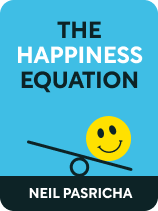

This article is an excerpt from the Shortform book guide to "The Happiness Equation" by Neil Pasricha. Shortform has the world's best summaries and analyses of books you should be reading.
Like this article? Sign up for a free trial here .
Do you worry about what other people think of you, looking for ways to gain social approval? How does striving for external validation erode your happiness?
Seeking validation makes you unhappy by pushing you to act in ways that don’t support what you really want. Many of “your” goals are actually an attempt to gain approval from others, and the way you judge yourself depends on how you perceive others’ reactions to you. When you put so much weight on others’ opinions, you erode your own happiness because chasing external validation breeds self-contempt and prevents you from pursuing things that you actually find meaningful.
Here’s how chasing validation erodes your happiness.
Seeking Approval From Others
When your happiness depends on external validation from others, you feel impelled to project a pleasing or impressive image of yourself that invites positive feedback. You make decisions about how to look and behave, your career, and your possessions to support this image. However, making decisions and setting goals based on how you want others to react to you creates internal conflict for three reasons:
- Different people have different perspectives and expectations. Your behaviors and goals can’t please or impress everyone, so you won’t always receive positive feedback.
- Basing your happiness on external validation forces you to conform to what other people want instead of what you want—because pleasing yourself won’t always elicit the feedback you crave.
- Your motivation to please or impress others forces you into constant comparison and competition. You strive to be more like people who receive the validation you want and set yourself ambitious goals to outdo them.
This internal conflict erodes your confidence and elicits feelings of self-contempt. You never feel like you’re good enough to receive the validation you crave because there are always new expectations to meet or ways that others appear to be doing better than you. Overall, you spend more time seeking validation and less time feeling happy with who you are.
| How Seeking Validation Affects Self-Judgment and Behavior Research in the area of authenticity confirms Pasricha’s claim that many people base their happiness on how they think others perceive them. Further, psychologists agree that acting inauthentically—projecting an image that conforms to what you think others want from you—makes you unhappy. Further, the research concludes that feelings of discomfort and inauthentic behavior go hand-in-hand. Consequently, you can figure out if you base your happiness on others’ opinions of you by considering how often you feel: – Embarrassed by things you’ve done or said – Awkward and self-conscious in daily interactions – Resentful and misunderstood – Afraid of what others think of you – Rejected and unheard These feelings both reflect and encourage inauthentic behavior and feelings of unhappiness. For example, sometimes shy people come across as loud and overbearing. This is because their discomfort around others leads them to overact to compensate for their shyness. As a result, they find themselves adopting a gregarious persona to mask their shyness (thus projecting a false image). This leads them to question whether people like them for who they are or for the act they put on. As a result, they feel more uncomfortable about interacting with others and this impels them to continue projecting an altered image of themselves. |
| How Seeking External Validation Motivates Status Goals The Tao Te Ching, one of the ancient foundational texts of Taoism, clarifies how seeking external validation influences your goals and makes you unhappy. It explains that a desire to receive external validation leads you to choose status-based goals, such as wealth and power, so that you can prove your worth to others. However, status-based goals have no upper limit and are therefore impossible to “achieve”—they drive you to always seek more instead of feeling self-worth and happiness with what you have. Your desire to fulfill this never-ending goal—and finally receive the validation you crave—consumes you and surpasses your desire to feel happy now. As a result, you redirect all your energy and focus away from your well-being. Instead, in the pursuit of the possibility of future happiness, you ignore your emotional and physical health, engage in competitive or controlling behaviors, or act inauthentically. |
Solution: Accept Who You Are and Figure Out What Makes You Happy
Instead of seeking validation, focus on feeling happiness. Free yourself from the need for validation by accepting who you are and what you need to feel happy. Pasricha argues that this shift in thinking encourages a cycle of happiness: Self-acceptance inspires you to align your behaviors and decisions with what makes you happy. This alignment encourages positive self-judgment and influences you to make decisions that further increase your happiness.
(Shortform note: Another way to think about this is to consider what’s motivating you. Some experts believe that all behavior is driven by the need to fulfill one of two motivation types: intrinsic or extrinsic. Intrinsic motivation comes from your internal self: You engage in an activity because it makes you happy. You accept your needs and feel comfortable expressing them (for example, you listen to a particular song because you enjoy it and aren’t worried about how others will judge you). Extrinsic motivation comes from your environment: You engage in an activity because you receive an external reward for doing it and it’s what others want from you. You ignore your needs in favor of seeking acceptance from others (for example, you pretend to like a particular song because you’re afraid of feeling left out of your social group).)
Furthermore, the more you encourage positive self-judgment and engage in things that make you happy, the less time you waste thinking about how others perceive you. This helps you accept yourself exactly as you are and frees you from the pressure of adapting to please or impress others.
According to Pasricha, this increases your happiness in two ways: First, placing less weight on what others think of you decreases insecurity and self-consciousness and increases self-confidence. Second, because you’re not projecting a false image of yourself or hiding behind achievements, you feel comfortable knowing that people appreciate you for who you are, not who you’re pretending to be. This naturally improves your self-judgment, allows you to relax and enjoy being yourself, and encourages you to make decisions that continue to fuel your happiness.

———End of Preview———
Like what you just read? Read the rest of the world's best book summary and analysis of Neil Pasricha's "The Happiness Equation" at Shortform .
Here's what you'll find in our full The Happiness Equation summary :
- How to overcome the four common obstacles to happiness
- The five methods to reduce the toll of trivial tasks and decisions
- Why you need to stop chasing external validation






